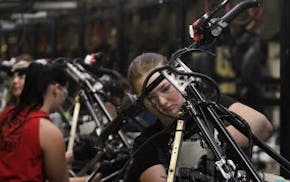Midway through "I hate myself. Will you please love me?" by ARENA Dances, we hear quotes from hit brother-sister act the Carpenters. "It's hell living like a pair of angels," says Karen. "We're very happy," counters Richard. Revealing words from a musical duo responsible for some of the sunnier songs of the 1970s. Their story serves as dark inspiration for choreographer Mathew Janczewski's latest project, an evening-length work that never fully illuminates the tension between personal image and public persona.
A retro mood is set with live renditions of Carpenters tunes performed by the Steel Blue Band as the audience enters the theater. And from the start, the piece pays homage to the pure-voiced Karen, a tragic icon who died from causes associated with anorexia. Rachel Freeburg, Renee Starr, Sarah Steichen and Abby Ann Swenson drift into the diffuse light in costume colors favoring the burnt oranges and beiges of "Me Decade" fashion. After donning brunette wigs, they are entirely transformed into a quartet of Karen clones.
The "Karens" share the stage with two "Richards," Tristan Koepke and Luke Olson-Elm, who skip through with oblivious confidence. Big brother is a PR-conscious manipulator who treats his younger sister like a child, protectively embracing her one moment, parading her around the next. Constant adjusting of kerchiefs around their necks suggest both an obsession with appearance and bridle-like control.
The infantilizing of Karen is a running theme, and Janczewski deploys piles of stuffed animals to make this point. The female dancers organize them into careful rows while the male dancers destroy the orderliness, squishing the toys underfoot. While there are hints that Karen asserts herself, this broader dimension of her character is relatively unseen.
"I hate myself" is ultimately about pretend happiness. The dancing, even to the most upbeat of Carpenters songs, plays constantly with façade. Reality emerges in the form of emotional breakdown, and while the illusion of harmony is restored, we know what the future holds. And perhaps because we do, the work struggles to enlighten us further, despite Janczewski's dedication to the subject matter. The bumpy textures of the sibling dynamic, the cynical machinations of fame, the desire for perfection, the loss of self -- these issues are present, but now seem just duly noted and ready for further examination.
Caroline Palmer writes about dance.
4 are now charged in inside job armed robbery of Hopkins grocery store that netted $45K

Minnesota added thousands of jobs in March but worker shortage still an issue
Private prison van driver, accused of raping St. Paul woman he was transporting, gets 30 years for similar attacks

